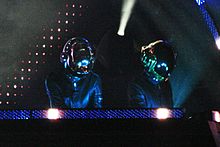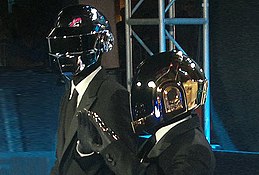Daft Punk
Daft Punk | |
|---|---|
 Daft Punk in one of their live shows. | |
| Background information | |
| Origin | Paris, France |
| Genres | House |
| Years active | 1993-2021 |
| Labels | Soma Quality Recordings (1993-1996), Daft Life, Virgin Records (1996-2012), Columbia Records (2013-present) |
| Past member(s) | Thomas Bangalter Guy-Manuel de Homem-Christo |
| Website | Official Website |
Daft Punk were an electronic music duo from France. There are two people in the band, Guy-Manuel de Homem-Christo (born February 8, 1974) and Thomas Bangalter (born January 3, 1975). Daft Punk used analog synthesizers and other real instruments to make their music. On 22 February 2021 they released the video "Epilogue" that announced the end of Daft Punk as a group.[1]
History
[change | change source]1987–1994: Group starts as Darlin'
[change | change source]Both of the Daft Punk members went to the same school in Paris. They became friends and recorded a demo track with other students from the school. Thomas Bangalter played bass guitar, and Guy-Manuel de Homem-Christo played guitar. They formed a band called Darlin'. Darlin' had another member named Laurent Brancowitz. Darlin' did not last very long. Brancowitz left the group and joined Phoenix. This was a band his younger brother, Christian Mazzalai was in. After a concert in the United Kingdom, a newspaper said the band's music was "daft punk" (silly punk music).[2] Thomas and Guy-Manuel liked the words "daft punk". They made a new music group named Daft Punk.[3]
While attending a rave at EuroDisney, they met Stuart MacMillan of Slam. He let them join the record label Soma Quality Recordings based in Glasgow.
Daft Punk recorded their first demo. It was called "The New Wave".[4] They made other demos, such as "Alive" and "Da Funk". Both of these were on the group's first album.[4]
1995–1998: Homework
[change | change source]In 1995, Daft Punk recorded a song named "Da Funk". It was their first commercial success. After making the song, Daft Punk looked for a manager. They hired Pedro Winter, who is also known by the name Busy P. The group joined Virgin Records.[5]
Daft Punk released Homework in 1997. This was their first studio album. The album was popular. It helped make French house music more popular. It went on the Billboard 200.[6] The album had many singles. The most popular single from it was "Around the World". Daft Punk made many music videos for Homework.[7] After making the album, Bangalter and Homem-Christo made their own record labels. They made more music.
1999–2003: Discovery
[change | change source]In 1999, Daft Punk returned to recording studio to work on Discovery which would be their second album and their second success. Discovery reached the second place on the UK Albums Chart. "One More Time", the first single from Discovery, was very popular around the world. Daft Punk became one of the most famous electronic music groups.
Daft Punk used many samples (sounds from other music) to make songs such as "Face to Face", "Too Long" and "Harder, Better, Faster, Stronger". Kanye West's 2007 song "Stronger" from the album Graduation samples "Harder, Better, Faster, Stronger".
In 2003, Daft Punk released the animated movie Interstella 5555. The band worked with the Japanese animation company Toei Animation and the famous Japanese producer Leiji Matsumoto to make the movie. It is a story that is set to the Discovery album with no additional words and only a few added sound effects.
2004–2010: Human After All, Tron: Legacy
[change | change source]
In 2004, Daft Punk spent six weeks on their third album. Human After All was a subject of controversy, concerning some aggressive aspects in songs such as "Technologic", saying that most of the songs were too repetitive. De Homem-Christo and Bangalter said "We believe that Human After All speaks for itself".
In 2006, Daft Punk released "Electroma", a short film about two robots (Daft Punk themselves) who are on a journey to become human. The film however, did not feature any music by Daft Punk but instead a selection of songs by other artists of different types of music genres. Daft Punk went on their second world tour, "Alive 2006/2007". The duo played worldwide to thousands of people. Daft Punk played in a pyramid on stage which was admired for its futuristic design.
In 2008, Daft Punk made their first televised performance at the 2008 Grammy Awards. They performed with Kanye West as he rapped, "Stronger". In 2010, Daft Punk were chosen to compose the soundtrack to Tron: Legacy. The duo had a cameo in the film.
2011–2015: Random Access Memories
[change | change source]In 2013, Daft Punk released their final album, Random Access Memories. Columbia Records became their new label after many years with Virgin Records. The group worked with Giorgio Moroder, Todd Edwards, Nile Rodgers, Panda Bear, Chilly Gonzales, DJ Falcon, Julian Casablancas, Paul Williams and Pharrell Williams on the album. Random Access Memories had very little electronic music in it. Instead, Daft Punk used live instruments and minimized the use of synthesizers. The album is a tribute to the disco, rock and funk music of the 1970s and 1980s.
The lead single from the album, "Get Lucky", was met with critical acclaim and topped many charts around the world. It featured Pharrell Williams and Nile Rodgers. At the 2014 Grammy Awards, "Get Lucky" won Record of the Year and Random Access Memories won Album of the Year.
In 2015, a documentary called "Daft Punk: Unchained" was released. It told the history of the band from their beginnings in the early 1990s to the 2014 Grammy Awards.
2016–present: Final projects
[change | change source]In 2016, Daft Punk worked with The Weeknd in the singles "Starboy" and "I Feel It Coming". They performed both songs at the 2017 Grammy Awards. It was their final performance together. In 2021, they announced their breakup via YouTube.
References
[change | change source]- ↑ Kyriazis, Stefan (22 February 2021). "Daft Punk announce split and release Epilogue farewell video - Why did Daft Punk split?". Express.co.uk.
- ↑ "Review of Shimmies in Super 8". Melody Maker. April–May 1993.
- ↑ "Daft Punk" (in French). RFI Musique. 3 December 2007. Archived from the original on 29 July 2009. Retrieved 6 July 2009.
- ↑ 4.0 4.1 "The New Wave" (12" vinyl liner notes). Daft Punk. UK: Soma Quality Recordings. 1994. SOMA 14.
{{cite AV media notes}}: CS1 maint: others in cite AV media (notes) (link) - ↑ Woholeski, Peter (May 2001). "One More Time: Four Years After Its Filter Filled Splashdown, Daft Punk Retirns With Discovery – Complete with House Beats, Disco Sweeps and, Yes, Plenty of Vocoders" Archived 22 August 2001 at the Wayback Machine . DJ Times. Retrieved 5 May 2007.
- ↑ Reighley, Kurt (October 1997). "Let's Go Discotheque – A Survey of French Dance Music". CMJ New Music Monthly. No. 50. CMJ Network. p. 22. ISSN 1074-6978. Retrieved 31 January 2013.
- ↑ Deming, Mark. "Daft Punk: D.A.F.T. – A Story About Dogs, Androids, Firemen, and Tomatoes (2000)". Allmovie. Archived from the original on 26 October 2012. Retrieved 24 December 2012.
